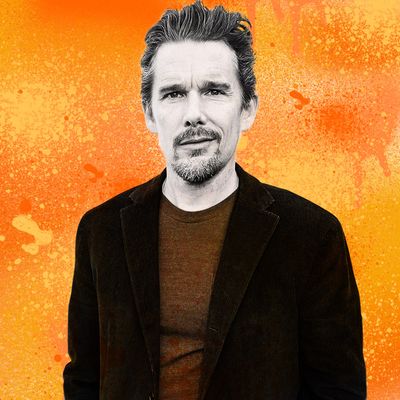
This month, as we move deeper into Oscar-bait season, let’s take a moment to recognize the unexpected rebirth of Ethan Hawke, a solid Best Supporting Actor nominee possibility for his stirring performance in Boyhood. His upcoming documentary-directing debut, Seymour, about an elderly piano virtuoso, has already drawn positive notices. And his new film, Good Kill, was just picked up for wide distribution. It has been a good year.
This is quite a turn for Hawke. Remember, there was Uma Thurman, novels, the independent and action films he starred in, the screen adaptation of his novel The Hottest State, directing Chelsea Walls, the literary-prize committees, the Russian aristos he played on stage (Ivanov). Throughout, an aura of the mid-1990s always trailed Hawke, like a spritz of CK One or a gulp of Zima. In every historical play he performed in (even Tom Stoppard’s Coast of Utopia), his entrance always seemed accompanied by a phantom Paul Westerberg soundtrack.
Between the 1990s and now, there has also been the rise of his cultural younger brother, James Franco. Like Hawke, James Franco occupies the greasy indie-heartthrob space and has dabbled widely. We might even say histrionically. Like Hawke, Franco is an actor-slash-everything. Together, these fellows have practiced a dark art I call brocolage. Brocolage is derived from bricolage, a word for when we use a diverse range of the available materials or fragments and bring them together in a single work. Simply put, brocolage takes bricolage’s shards and gives them a bro-ish spin. It’s bohemian pastiche with a laddish swagger.
That might not sound like a bad thing. Yet often it is. After all, this whole Renaissance Hipster thing runs on privilege, usually that of being male and celebrated enough to believe that you can try your hand at any form that catches your fancy. Both Hawke and Franco have for years been using the advantage of celebrity and talent in one area — acting — to overcome the barrier of entry to others. This privilege is sexy in its own way: the sexiness of getting away with something, the allure of the dilettante. You don’t have to be a French theorist in the 1980s to see that there’s now far more glamour to being a successful impostor than to being the real thing. You get to be seen as an artist or a novelist without having to do the tedious stuff that said creators have had to do to in order to get the same recognition — if it ever comes.
Hawke has finally escaped this fate, though, with the fine, modest Seymour (no Interior: Leather Bar hamming it up here). His gifts have finally cohered with his triumphantly naturalist work in Boyhood. He does fewer things these days, but he does them all well.
Hawke, or at least the idea of him, and I go way back. When I was 22, I worked for an online film database called Baseline. It was a proto-IMDb staffed by professional writers and editors, long before amateurs did nearly as good a job of compiling film databases as the professionals. For the site, I wrote Hawke’s biography as well as reviews of his early 1990s oeuvre. I thought often of Reality Bites’ Troy, surrounded by all those candles in wine bottles, endless pairs of brown corduroy pants, infinitely slamming doors. Hawke was both annoying and genuine. I liked him.
I am sure my generational tendencies predispose me to liking him. (I’m not the only one: Essayist Michelle Orange has written about looking in the mirror and imagining Ethan Hawke looking back.) Hawke was for years Gen X’s liberal-arts albatross, oh-so-earnestly moving from domain to domain with the familiar rat-tat-tat voice and askew hair, the aggressive self-awareness, the sometimes-chagrining overreach. (He even admitted to said overreach in a recent Reddit AMA.) At his worst, he is still an emblem for pretension. Yet that same pretension resides within myself and within the people I like.
Hawke signified a whole cohort: a group that didn’t want to look like it believed in either aging or ambition yet couldn’t help but give in to both. Today, the Death-of-the-Creative Class-ism of his generation weighs on Hawke — as it weighs on me — and deepens his line readings, giving them a surprising gravitas. It’s etched in there, next to the crow’s feet and frown lines, this achiever’s guilt: I have thrived but the others like me have not. They deserve success but it will never arrive. That heaviness is there in Boyhood, when he drives the goateed actor Ellar Coltrane, who plays his son (of course, a teenager with artisanal facial hair would play his son) around in his new SUV. Hawke — and his character — have settled down, and both are okay with that. He made a modified set of aspirations work for him. Ethan Hawke was once the mascot we did not ask for. He has become the one we deserve.

